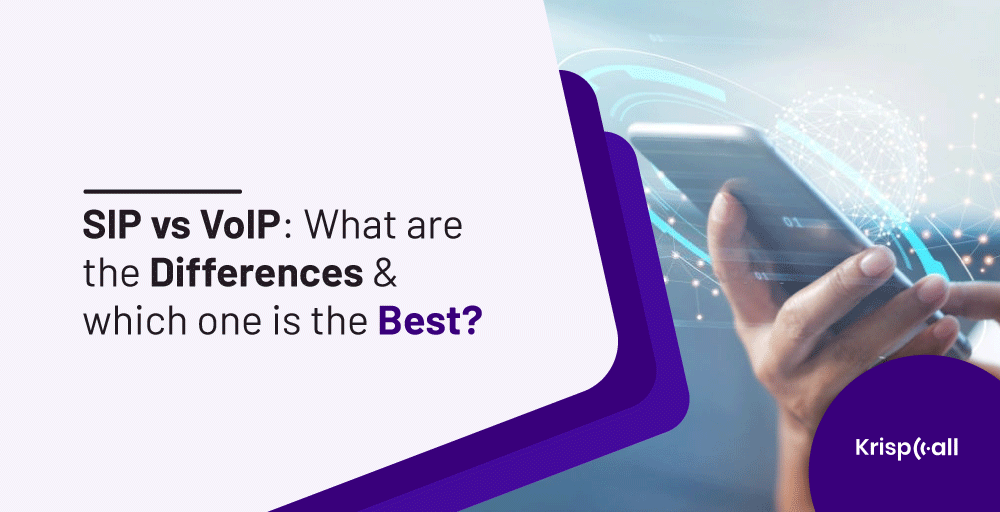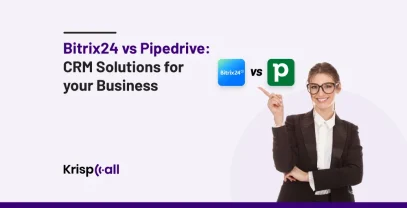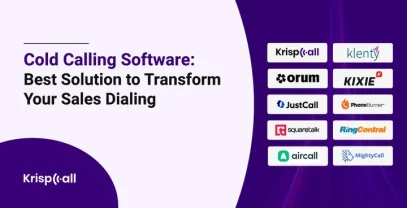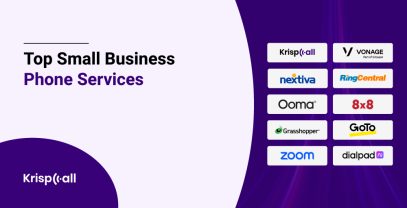In the modern workplace, business interactions are primarily conducted via email, SMS text, video conferencing, and cloud-based chat platforms instead of traditional telephone calls. 📞
So, a communication provider’s services should go far beyond just voice calls for most businesses.
And the modern technology has made internet-based communication the go-to standard for businesses.
When exploring business phone systems, you’ve likely come across terms like SIP and VoIP. You may be curious about what these terms mean, and which option is best for your situation. 🤔
🔑 KEY HIGHLIGHTS
- SIP and VoIP are integral components of modern communication systems, with each serving a specific role.
- SIP allows communication across various mediums such as voice, video, and messages whereas VoIP primarily focus on voice communication.
- VoIP offers less flexibility and scalability in compared to SIP.
The following guide to SIP Vs VoIP will teach you what each term means, their pros and cons and tips to select the solution that best fits your needs. 👊
What is VoIP?
VoIP (Voice over Internet Protocol) is the technology that allows you to make voice calls through the Internet. With VoIP, users can manage phone calls using their computers, smartphones, and other mobile devices.
A VoIP system is affordable and also offers a number of unique digital features. In conjunction with them, companies can add phone lines, conduct conferences, and set up mobile phone calls without incurring additional costs.
How VoIP works?
VoIP works by routing phone calls via the Internet. VoIP signals are converted to regular phone signals before they reach their destination when they call a landline.
VoIP software, also known as a VoIP softphone app is available on internet-enabled devices like smartphones, tablets, and computers. Wireless hotspots such as those found at airports and cafes, or cell towers, can be used to connect to the Internet.
The way VoIP transmits data packets uses the same signals as other devices. After arriving at their destination, the data packets are reassembled into the audio signal using a digital-to-analog conversion process. This is how the recipients hear your voice as in normal phone calls.
What is SIP?
SIP (session Initiation Protocol) is a protocol that starts, manage and end multimedia communication sessions, such as voice and video calls using VoIP. This protocol is developed and standardized by the Internet Engineering Task Force (IETF).
Instead of getting bogged down in the technical jargon of the SIP definition, emphasis should instead be placed on the benefits that SIP provides your customers.
Essentially, SIP includes the messages traveling between endpoints and how each session is established and terminated. It can be used by organizations to communicate between many endpoints or between two. SIP is not only suited to voice calls, but it can also be used for video conferencing, instant messaging, media distribution, and other applications.
How SIP works?
SIP works by establishing the connection between two participants: the person making the call and the one receiving it. Moreover, SIP is not only limited to audio calls; it’s also utilized for initiating video sessions and instant messaging exchanges, where information is sent between internet users.
Using the SIP protocol, users can make free voice and video calls. Two or more parties can be connected through a SIP session. Receiver devices hear the caller’s voice via SIP because it decodes VoIP data. Aside from VoIP, SIP can also initiate, modify, maintain, and terminate real-time messaging, video, and other communication methods.
Similar to the HTTP protocol, SIP text-based language is used to send data over the net. SIP is also similar to the SMTP protocol, which is used for email transmission.
The SIP coding is used in practice to describe the identity of participants and their ability to be contacted through an IP network. The SIP protocol supports multiple endpoints. This is demonstrated in practice by video conference calls involving multiple parties, which are commonplace today in business.
The service is free worldwide, and users can get free SIP addresses and SIP applications as well. Additionally, SIP-telephony is not subject to any restrictive laws.
SIP vs. VoIP: What are the differences?
In general, SIP vs. VoIP cannot be directly compared. SIP is the standard communications protocol that most VoIP deployments use, but VoIP can be referred to as a term that can refer to any internet-based telephone service.
Even though SIP technology supports and scales VoIP, not all VoIP is supported by SIP. As a business VoIP solution, SIP is just one of the protocols that can be used to scale communications beyond voice-only communications and enable multimedia communications like video conferencing and instant messaging.
The major differences between SIP and VoIP are:
| SIP | VoIP |
|---|---|
| SIP allows communication across various mediums such as voice, video, and messages. | VoIP primarily focus on voice communications and messages. |
| SIP offer more flexibility. | VoIP is less flexible in compared to SIP. |
| SIP is a signaling protocol that enables VoIP. | VoIP use various protocols including SIP as one. |
| SIP functions on its own. | VoIP relies on SIP protocol. |
| SIP needs the right software and hardware. | VoIP depends on a good internet. |
What are the benefits of VoIP?
The benefits of VoIP are:
Portability
Your VoIP number will travel with you since it is virtual. In other words, if you give out your business number, you will not need to be present at the office to receive the call. It will instead be with you wherever you go. As a result, you won’t need to change your work numbers if you need to travel for work or if your office moves.
Scalability
The scalability of VoIP makes it an extremely attractive technology. Most businesses don’t stay the same size for very long. They expand and grow. Using VoIP, you can keep up with the needs of your growing business without sacrificing the functionality of your system.
Affordability
VoIP is widely favored because of its affordability. VoIP is cheaper than traditional calls since it uses the internet to transmit information. And if you are using a VoIP softphone, it doesn’t even require dedicated telephony hardware saving your cost.
Feature-Rich
VoIP offers an extensive feature which traditional phone lines lack. Call recording, call forwarding, call masking, Interactive voice response, and auto attendant are some of the features available in VoIP system.
Flexible with multiple devices
You can use VoIP on multiple devices without cluttering your desk with multiple phones. The VoIP systems are instead designed to run remotely via the Internet or directly from the personal computer.
The flexibility built into this solution allows for mobile workforces that are always connected and always on the go. In addition, the business will be able to save money and space by reducing its hardware requirements.
What are the benefits of SIP?
The benefits of SIP are:
1. Affordability
Rent for lines is significantly lower than traditional PSTN lines, and calls are cheaper than they used to be, whether local, mobile, national, or international.
2. Reliability
Whenever you choose a provider dedicated to giving you the best service, they will openly discuss your data service and help you decide how our SIP service can be run in the most efficient way possible.
3. Multiple Users
SIP is capable of accommodating multiple users. If you need to hold conferences with multiple users, they can join the call using whatever method suits them best. Unlike other protocols, users can join video calls through audio calls rather than via video and then switch to audio.
How to get started with VoIP?
VoIP methods require slightly different equipment depending on how you use them.
The most important thing you need is a strong and reliable Wi-Fi connection. The most reliable connections tend to be fiber-optic ones. If you subscribe to unlimited broadband, you can communicate as much as you want without incurring additional charges.
To get started with VoIP services, first, you need to decide whether you need a VoIP hard phone or softphone for your business. If you value flexibility, scalability, and affordability, a softphone works best for your business. For that, however, you need a softphone phone app and a stable internet connection.
And if you are looking for a softphone for your business, KrispCall is worth taking a look at. Be it a smartphone, tablet, computer, or any internet-connected device, you can make and receive phone calls seamlessly.
In addition to regular telephony services, there are several additional features that make call handling and workforce management much easier. For efficient call management, you can use features like IVR, auto attendant, skill-based routing, automatic call distribution, among others.
Besides the long list of incredible features, what’s impressive about KrispCall is its affordable pricing. All these features are available at a starting price of $15/month. First-time users can even use it for free as there is a free demo to take advantage of.
SIP Vs VoIP. Which is better?
SIP and VoIP are integral components of modern communication systems, with each serving a specific role.
SIP, as a protocol, is responsible for initiating, managing, and ending multimedia communication sessions, while VoIP enables the transmitting voice calls over the Internet.
The choice between SIP and VoIP depends on the specific needs and preferences for a communication system.
If your focus is only on voice communication, VoIP is better for you but if you are looking for additional features like video conferencing, and instant messaging, SIP might work for you.
SIP is better choice for you if you are seeking flexibility and scalability in handling growing number of users and devices.





